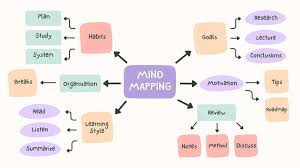Everyone experiences mental fog occasionally. Stress, aging, lack of sleep, and an unhealthy lifestyle can exacerbate it.
Imagine a final-year student juggling examination preparations and a project defense—such pressure can lead to stress, sleep deprivation, and mental exhaustion.
These challenges can affect memory, problem-solving skills, and overall cognitive function. To combat this, engaging in brain exercises can sharpen mental agility, improve focus, and enhance resilience.
In this article, News Round The Clock highlights seven effective brain exercises to try.
1. Mind Mapping

Mind mapping is a technique that helps organize thoughts, collect information, retain knowledge, and generate ideas.
Research suggests that students use mind maps to retain study materials while professionals utilize them to break down large projects into manageable tasks.
Mind maps can improve retention rates by up to 32 percent, thus promoting a healthy lifestyle.
Although there are no strict rules for mind mapping, the following guidelines can help:
a. Start with a central image.
b. Connect main topics with branches.
c. Use keywords to label each branch.
d. Connect subtopics accordingly.
e. Incorporate images, symbols, and colors for better visualization.
f. Highlight key points to emphasize importance.
Looking at examples of mind maps can provide insight into their versatility and effectiveness.
2. Mnemonics and acronyms
Mnemonics convert complex information into memorable phrases or short forms that are easier to recall. They are commonly used to remember names, number sequences, medical protocols, and even the colors of the rainbow.
Different mnemonic techniques include keyword mnemonics (associating new information with familiar words), chunking (breaking information into smaller, digestible parts), musical mnemonics (using rhymes or songs for memory enhancement), and acronyms and acrostics (creating words or phrases from the first letters of a sequence).
Since people learn differently, it’s essential to find the mnemonic method that works best for you.
3. The 5-4-3-2-1 grounding technique
The 5-4-3-2-1 technique is a mindfulness exercise that enhances awareness and focus by engaging the senses. It helps stay present and reduce stress.
To use this method, identify 5 things you can see, touch 4 objects around you, listen for 3 sounds, smell 2 different scents, and taste 1 thing (such as a sip of water or a snack).
This technique helps anchor your mind in the present moment, reducing anxiety and improving concentration.
ALSO READ
4. Play memory-boosting games
Playing cognitive games can enhance memory, problem-solving skills, and mental agility.
Games such as Chess, Sudoku, Scrabble, Crossword Puzzles, and brain-training apps have been shown to improve cognitive function.
However, while these games stimulate the brain, they do not guarantee increased intelligence.
To maximize their benefits, combine them with a healthy lifestyle, including regular exercise, nutritious food, and social interaction.
5. Learn a new language
Learning a new language strengthens neural connections, improves memory, and enhances problem-solving skills.
Studies, such as those conducted by the British School of Barcelona, show that it also strengthens Broca’s and Wernicke’s areas of the brain (responsible for language processing), enhances brain plasticity, increases gray matter density, while promoting cognitive reserve.
Additionally, learning a new language improves multitasking, decision-making, and creativity while slowing down brain aging.
6. Teach what you learn
Teaching others reinforces your understanding and helps you retain new information. You can do this by rewriting the information in your own words, explaining concepts to a friend or colleague, writing a blog post, creating a podcast or video, or participating in group discussions.
The more you teach, the stronger your grasp of the subject becomes.
7. Prioritize sleep
Sleep isn’t an active brain exercise, although it plays a crucial role in cognitive function.
According to the National Institute of Neurological Disorders and Stroke, most adults need 7 to 9 hours of sleep each night; however, many people get far less.
A 2015 review highlights the benefits of sleep, including boosting memory recall, reducing mental fatigue, and regulating metabolism.
Conversely, chronic sleep deprivation negatively impacts reaction times, mental clarity, and overall brain health. Therefore, adequate sleep is essential for maintaining cognitive function and overall well-being.